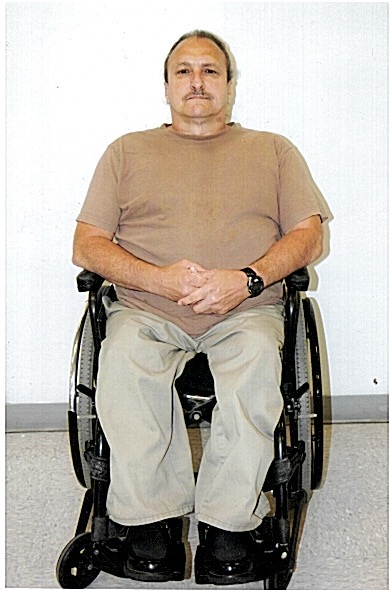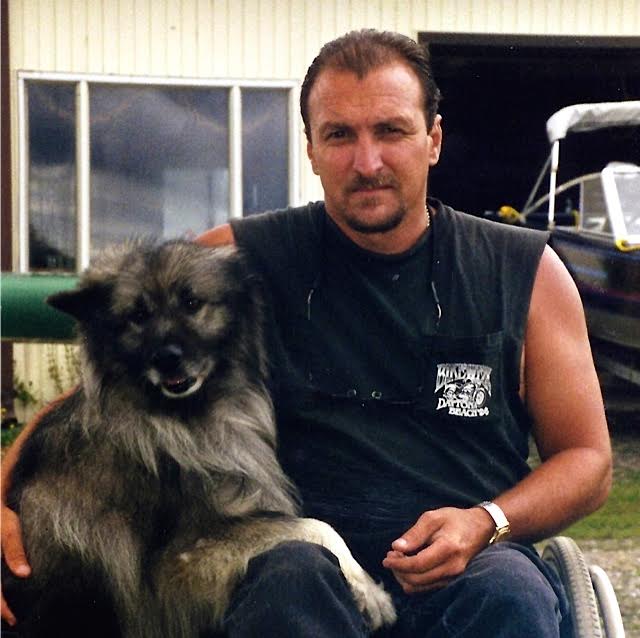
Michael Pelletier is Serving Life for Pot – He has over 113,000 signatures on his petition on Change.org – Please sign and share.
Name: Michael Pelletier, #11109-036
Offense: Importing and Distributing Marijuana
Sentence: Life without parole
Incarcerated Since: 2006
Served: 14 years
Raised: Madawaska, Maine
Tried: Banghor, Maine
Will live: With brother Dave in Florida
Priors: two minor pot related priors
Date of Birth: 1/31/56
Age: 64
Family: No children. Elderly father, 8 siblings.
Heath Issues: Michael has been a paraplegic since he lost the use of his legs in a farming accident at age 11. He has had no physical therapy since being incarcerated and has had four blood clots in his left leg among bladder issues and other complications associated with his disability.
Supporters: CAN-DO, Freedom Grow Forever, Life for Pot, Mission Green
Institution: USP Terre Haute, Indiana.
Clemency status: Pending – Clemency Case # C174947
Accomplishments – Michael is an accomplished artist and teaches the art of painting to other prisoners. View more examples of Michael’s art here.
According to Michael:
“My father recently passed away so I will never have that moment to say good-bye or hug him upon my release from prison. I know he was hanging on to see me go free, and for that I horribly regret that I could not lift the sadness that my incarceration laid upon his heart.”
The mere fact that Michael is a paraplegic should be grounds for mercy in the form of clemency or a compassionate release. He poses no threat to society and has paid dearly for his participation and involvement in importing and selling marijuana. If Micahel does not receive clemency, he will endure a very painful existence due to the lack of any physical therapy, or medical care necessary for someone with Michael’s handicap.
Post Release Plans: Michael will live with his brother, Dave. He has 7 siblings that will provide for Michael to assure his transition is a smooth one and to ensure his needs are met.
About Michael’s case:

Paraplegic Michael Pelletier is serving LIFE for POT
When Michael was 11 years old, he hitched a ride on the back of a tractor that his brother, Gerry, was driving while hoeing potatoes. When the tractor took a sharp turn, Michael fell. Not realizing that his brother had fallen off, Gerry drove over him, crushed Michael’s stomach, snapped 1 inch of his spinal cord and paralyzed him from the waist down. Tragically, Michael’s life would never be the same.
When Pelletier was 14 years old, he began to experiment with marijuana, as many young people do, only in Michael’s case, he discovered the therapeutic benefits of this plant long before there was any legitimate, scientific research, or passage of any state, “medical marijuana” propositions that have since become common, nationwide. Pelletier learned that cannabis lifted his depression, and numbed the pain associated with his disability. The cannabis seemed to provide relief, not only for depression, but for a myriad of ancillary issues associated with his paralysis and incapacitation, such as bladder spasms and his spinal injury at T-7 with transection of the cord. The revelations that Pelletier experienced are not meant to minimize the severity of his crime, rather provide insight into his state of mind that led him to engage in a risky endeavor that would cost him far more suffering than the temporary relief he enjoyed associated with his recreational use of marijuana, that later grew to importation and distribution of this Schedule 1 narcotic.

Dana Rohrabacher Representative (R-CA 48th District) since 1989 poses with Michael Pelletier’s portrait of Clemency at the home of Amy Povah
Michael’s original desire to secure cannabis for himself led to the obvious conclusion that he could share the balance of his procured cannabis with friends, who also wanted to obtain marijuana, and in doing so, pay for his own stash. He gradually progressed from a “dime bag” to larger quantities of pot, to satisfy his desire to smoke, get money back with a small profit and provide a familiar and trustworthy source of marijuana to his friends and eventually, his associates.
At 50, Michael Pelletier was indicted for for a nonviolent marijuana conspiracy offense and currently sits in federal prison serving a sentence of life without parole. In the instant case, Michael Pelletier readily admits that he arranged to have marijuana imported for his use and to sell to others. However, the testimony of cooperating co-defendants is suspect, such as Adam Halford who admitted at Pelletier’s trial he had exaggerated the amount of marijuana being imported to the grand jury. Even the Bangor Daily News reported, “Drug smuggler says he lied to grand jury.” Pelletier says the testimony was absurd, “we have a witness who admits he never learned to swim claiming he swam across the St. John River with amounts of cannabis he could not have even lifted.” Inflating the amount of drugs in a conspiracy case is not uncommon and Michael’s case appears to fall into this category.
While Michael’s recollection of the facts presented at trial differ from the testimony of his co-conspirators, he willingly admits that he did engage in the marijuana trade, so he is fully accepts responsibility for his actions.
Madawaska, Maine is just below the Canadian border and the family typically traveled into Canada to visit his mother’s extended family, that lived there, access restaurants, shopping and other modes of entertainment. It wasn’t long before Michael discovered that the marijuana he obtained in Canada was far superior to any he had sampled in the U.S. This triggered the impetus for Pelletier to smuggle small quantities of “BC bud” from Canada into the U.S. to share with his friends, which led to his first marijuana trafficking case in 1992. From there, Michael’s encounters with the law became a slippery slope, because he no longer respected a law that interfered with his access to a substance that afforded him some degree of relief. Moreover, Pelletier’s genetics did not mix well with alcohol. Alcohol made Pelletier hostile and defiant, which was not his normal disposition, according to everyone who knew him, and he did not like the way he acted when he drank, which caused Michael to favor cannabis all the more as his preferred means to self-medicate and as his favorite recreational choice to reduce stress.
According to Michael: “My father always instilled in me the strong conviction that I could do anything that I set my mind to and gave me the tools necessary to overcome adversity and lead a productive and positive life. I was never allowed to feel sorry for myself or to think ‘why me.’” Over the years, Michael’s father (and extended family) provided him with funds to open a restaurant, snack bar, ceramic shop and beauty salon. Except for the beauty salon – those endeavors failed to prosper and were viewed as another setback to Michael’s goal to become independent. Although Michael was successful at his watch and jewelry repair, which he continued to do from 1977 until his arrest for the instant case, he had the same burning desire that many red-blooded Americans have strived for – the American dream to be successful. Unfortunately, Pelletier decided that his key to success was one that would land him in prison.
Michael Pelletier has exemplary conduct and has never received a single incident report throughout the duration of his incarceration. He is currently thriving as an artist working with oil paints on canvas, perfecting his craft over the years to the extent he has developed an ever growing fan base that is spreading through social media. To date, Pelletier has over fifteen pieces of art and numerous advocates are in possession of additional paintings. This small income stream helps Michael pay against his extremely large fine and allows him to purchase new art materials so he can continue to paint and afford him some items on commissary.
Michael has taken advantage of many programs offered by the Bureau of Prisons and is currently learning how to play the guitar. Moreover, Michael volunteered to teach an art class to other inmates who have an interest in learning how to draw and paint in a variety of mediums, including water colors and oil based paints. Michael calls his class, “Brush Hour” and earns $4.80 from the Bureau of Prisons per month, meaning it is officially recognized by the administrative staff at Terre Haute. Michael hopes to develop his skills as an artist throughout the duration of his confinement and if he is fortunate enough to receive clemency, after his release. Both teaching and engaging in these artistic projects keeps Michael’s mind busy and distracts him from his handicap that restricts him from engaging in most activities, plus the realization that he is facing a life sentence, without parole.
In addition to completing numerous courses while serving time for his prior conviction, such as Anger Management and completing his GED (General Education Development) Michael has completed the following courses in Terre Haute where he is currently incarcerated.
Pelletier says he does not seek sympathy or special treatment, but also does not feel the punishment fits his crime. He says, “Having a life sentence is a feeling of dying every day. It’s worse than death that happens one time. It’s a living death.”
Michael loves to get cards and letters. Write to him here:
Michael Pelletier #11109-036
FCI Terre Haute
P.O. BOX 33
Terre Haute, IN 47808














